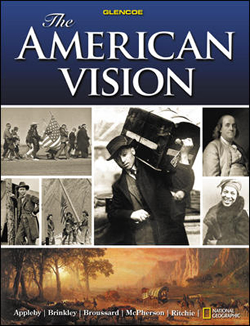
The American Vision © 2008Chapter 4: Federalists and RepublicansChapter OverviewsWashington and Congress Section 1 examines the establishment of the new national government. In 1789 George Washington became the first president under the new constitution and Congress introduced the Bill of Rights. The first Congress organized the judicial branch of government and created the first executive departments. Washington appointed Alexander Hamilton to head the Treasury Department and Thomas Jefferson to act as secretary of state. Hamilton's financial program—which included taxation, a system of public credit, and a national bank—sparked regional divisions and even caused a rebellion. Washington's support of Hamilton's programs enhanced the powers of the federal government, but the debate over these issues split Congress into factions. As a result, the nation's first political parties emerged. The Federalists supported Hamilton's vision of a strong national government which would promote manufacturing and trade. Democratic-Republicans agreed with Jefferson's ideas about limiting the power of the national government and promoting an economy based upon independent farmers. Partisan Politics Section 2 describes the foreign policy challenges of the Washington and Adams presidencies. British seizures of American ships and reports of British aggression in the western territories led George Washington to seek a treaty with Britain. Jay's Treaty avoided war, but it created political divisions in Congress. In Pinckney’s Treaty, Spain granted the United States the right to navigate the Mississippi River and deposit goods at the port of New Orleans. As Americans flocked westward, Native Americans in the Northwest Territory formed alliances to defend their land. After federal troops crushed their resistance, the Treaty of Greenville granted most of present-day Ohio and Indiana to the United States. John Adams narrowly defeated Thomas Jefferson to become the second president. During his term, the United States conducted the Quasi-War against France. Federalists in Congress enacted the Alien and Sedition Acts in an attempt to silence their critics. In response, Jefferson and James Madison drafted resolutions claiming that states had the power to reject or nullify unconstitutional laws. Jefferson was elected president in 1800 and the federal government came under Democratic-Republican control. Jefferson in Office Section 3 follows President Thomas Jefferson's eight years in office. After two Federalist presidents, Jefferson brought his Republican views to the presidency. Hoping to limit the scope of federal power, he reduced the federal debt, cut government spending, and eliminated the whiskey tax. Jefferson's enthusiastic support of western expansion led to the Louisiana Purchase and expeditions that fueled Americans' interest in the newly acquired territories. In Marbury v. Madison, Chief Justice John Marshall asserted the power of judicial review, or the right to rule on the constitutionality of laws. During his second term, Jefferson tried to keep the United States out of the war between Britain and France. An unpopular embargo halted trade between the United States and Europe and ended up paralyzing American industry. Congress repealed the embargo shortly before Jefferson left office. The War of 1812 Section 4 describes how the War of 1812 gave Americans a strong sense of national pride. When Republican James Madison assumed the presidency, war with Britain was already on the horizon. Americans were angry over trade restrictions and British seizures of American ships and sailors. Some western settlers blamed the British in Canada for inciting Native American attacks along the frontier. In Congress, War Hawks called for action, while northeastern leaders asked for restraint. Hoping to avoid war, both Madison and Congress tried strategies to force Britain to repeal its trade restrictions. A non-importation act against Britain finally worked, but not soon enough. In June 1812, the United States declared war on Britain. American forces tried to invade British Canada, but British troops successfully defended their territory. The British attacked Washington, D.C., and burned the White House and the Capitol, but they failed to capture Baltimore. General Andrew Jackson’s defeat of the British at New Orleans made him a national hero. A treaty ended the war, and the United States emerged from battle with a new spirit of national unity. |  |















